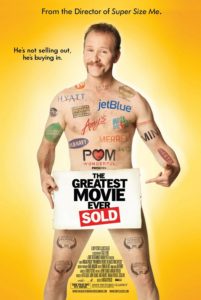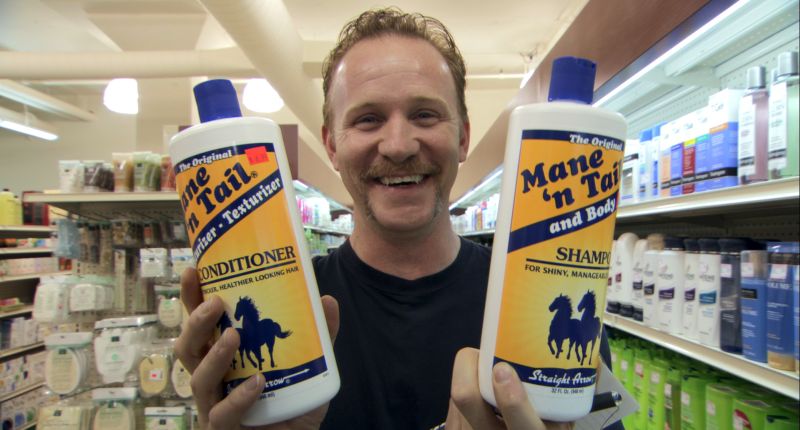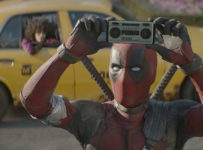 Morgan Spurlock is one of the few documentary filmmakers outside of Michael Moore to have taken on a corporate monolith and made a difference. With 2004’s Super Size Me, Spurlock set out to demonstrate the dangers of the ‘average’ American diet by eating nothing but McDonald’s for a month. While the science of Spurlock’s experiment remains in question, he did force the giant fast food company to change its menu and super size policy, including the addition of a new healthy choices menu and campaign here in Australia. Following the documentary series 30 Days and the poorly received Where in the World is Osama Bin Laden?, Spurlock turns his critical eye back on the same film industry that keeps him working.
Morgan Spurlock is one of the few documentary filmmakers outside of Michael Moore to have taken on a corporate monolith and made a difference. With 2004’s Super Size Me, Spurlock set out to demonstrate the dangers of the ‘average’ American diet by eating nothing but McDonald’s for a month. While the science of Spurlock’s experiment remains in question, he did force the giant fast food company to change its menu and super size policy, including the addition of a new healthy choices menu and campaign here in Australia. Following the documentary series 30 Days and the poorly received Where in the World is Osama Bin Laden?, Spurlock turns his critical eye back on the same film industry that keeps him working.
POM Wonderful Presents: The Greatest Movie Ever Sold sees Spurlock start with a very simple proposition: if major Hollywood blockbusters can achieve success through targeted advertising and cross-promotion of sponsor’s products, can the same be true of a documentary? In his quest to create a ‘docbuster’, Spurlock attempts to get sponsorship for his film, showing us the process of buying and selling advertising space within a film, along with actually fulfilling the multitude of contracts that result from his efforts. As the tagline for the film says, he’s not selling out, he’s buying in.
As one can tell from the full title of the film, Spurlock was successful in securing one sponsor to pay for the above the title advertising, with their brand name now forever associated with the film. The type of documentary filmmaking that Spurlock and predecessor Michael Moore engage in is somewhat naïve, or at least an oversimplified version of often complex world events. Yet where the areas were fairly grey around Spurlock’s Super Size Me experiment, the process of buying and selling real estate in films is a more straightforward process, at least outwardly. Most viewers will be familiar with product placement, or embedded advertising, and often known when we are being sold to. From the extreme example of I, Robot, in which a lengthy explanation is given as to why Converse are great, to the ‘cool’ factor of James Bond’s Sony gadgets in Casino Royale, embedded marketing is a fact of the film business. As Spurlock points out in the film, major franchise films will inevitably have the Happy Meal crossover with collectible cups, but the extent to which brands and filmmakers go to induce brand synchronicity may stagger some.
Spurlock’s ultimate outcome may not be all that surprising, but via interviews with industry heavyweights J.J. Abrams, Peter Berg, Jimmy Kimmel, consumer advocate Ralph Nader, Quentin Tarantino and of course, countless representatives from companies such as POM Wonderful, Hyatt, Jet Blue, Sheetz and the unpaid appearances from Mane ‘n Tail, Spurlock certainly hammers home the point that advertising is a part of everything we do, and every cultural facet of life. So much so that the ad-free zone of San Paolo in Brazil looks like an alien or rustic landscape. The bigger question for viewers is that if the advertisers can dictate so many terms for allowing their brand to be used in a movie, what other facets of our lives are being controlled by these conditions? More to the point, what corresponding conditions are being placed on the advertisers?

POM Wonderful Presents: The Greatest Movie Ever Sold is released in Australia on 11 August 2011 from Madman Films.
You can also check out this exclusive interview with Morgan Spurlock, conducted by David McVay of the Film Actually podcast, representing a dynamic group of bloggers known collectively as The League. The Reel Bits is a founding member.




